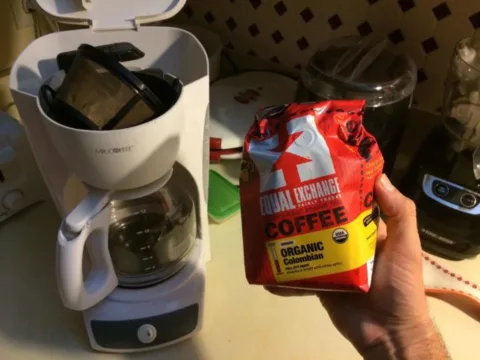I’m a self-professed coffee junkie, so it’s little surprise that my love for the bean led me to trying out organic coffee as of late.
While I’m pretty much a regular Joe who likes his Joe just as regular, I had to try some organic coffee to see if it really is any better than the coffee I usually buy.
As it turns out, I noticed a couple differences between organic coffees and the regular brew:
- The first (and most important, to me, the consumer) is price.
- The other marked difference I noticed is flavor, but the variance in taste was not as much as I expected.
I perceived a slightly less metallic flavor in the organic brew versus the regular coffee. This difference could have also been a minor variance in the water I used and how I brewed the coffee, too –so this should not be considered a scientific observation.
But beyond price and flavor, what makes organic coffee, as they say, “cool beans”?
Is there anything else about organic coffees — besides how they are grown — that makes them worth buying and drinking?
Perhaps. Let me explain…
What Makes Organic Coffee “Organic”?
Like other organic foods, organic coffees are grown without the aid of pesticides, herbicides, chemicals, and other additives which are commonly used to help protect and improve coffee output.
So, when an “organic” label is slapped onto a bag of coffee beans or ground coffee, it must have come from a farm that doesn’t use synthetic additives or fertilizer.
Commonly, organic fertilizer in the coffee industry is made from chicken manure, coffee pulp, and compost. In fact, organic fertilizer is one of the biggest factors in determining rather or not a coffee producer can be labeled organic.
Right now, the leading producer and exporter of organic coffee is Honduras, and South America produces the majority of the world’s organic coffees in general.
Must read: A Quick Guide To Coffee Certifications
Is Organic Coffee Really Better?
This question can be answered in 2 ways:
- Better for your health — Organic coffees are better for you because they are produced without the aid of potentially harmful chemicals that can affect your health.
- Lower impact on the environment — Organic coffees are healthier for the environment as they don’t use chemicals that can deplete the environment and harm the people who live on and tend to the coffee farms.
Consider this: 12 billion pounds of coffee are produced each year. If even half of that coffee was produced organically, the reduction in agricultural chemical use would be astounding — not to mention the health benefits to humans that drink coffee and those who are employed in the coffee industry.
Another point to think about is this: while the taste of organic coffee may or may not be all that different (it depends what you’re comparing the flavor to), organic coffee is much richer in antioxidants than regular coffee. That’s a difference you may not be able to taste necessarily, but one that could provide lasting health benefits.
One reason conventional and genetically modified coffee is still so popular with farmers is that it helps them beat the competition in the pricing wars and allows them to grow dense coffee crops in the full sun. In fact, these new-fangled, full-sun coffees became a big deal in the 1970s as coffee growers tried to maximize harvest yields and monetary profits.
Unadulterated coffee, meanwhile, thrives in the shade under the lush canopy of thick, tropical forests.
In other words, forests don’t need to be slashed and burned to make room for organic coffee crops, because natural coffee grows better in those woodlands anyway. Regular coffee, meanwhile, is usually grown on large sprawling farms that were once forested.
Is Buying Organic Coffee Just “The Right Thing To Do”?
The answer to this question is a resounding yes!
Those who find the price difference too great may take heart in knowing that the prices may be coming down in the years ahead, as it becomes less costly and more efficient for growers to produce organic coffee.
At this time, organic coffees account for 3% of the coffee market volume and around 33% of all organic beverage sales.
Organic coffee is still coming of age. In the mid 2000s, it represented a very tiny niche market. Now, there are coffee shops dedicated to serving only organic coffees.
I say if you haven’t tried organic coffee yet, go out and give it a shot. And if you swear by organic coffee, then keep brewin’ what you’re brewin’.
Meanwhile, I’m going to make a pot of organic coffee because the day’s still young and I’ve got a lot of writing to do…





